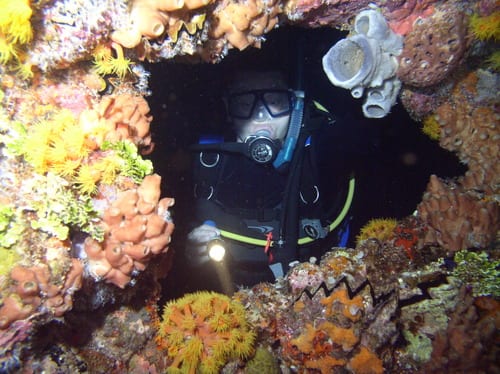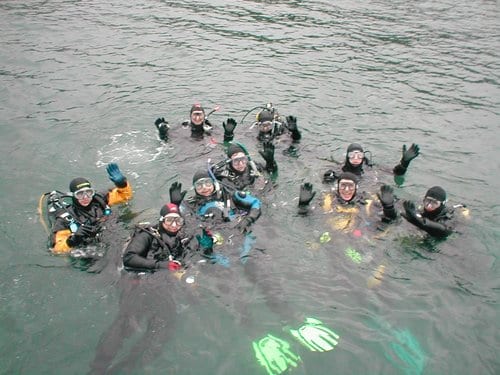Can I dive with diabetes?
"Can I dive with diabetes?" is one of the questions that our diving physicians hears most often. Dr Ashford provides some advice for diabetic divers.
Before we consider whether you can dive with diabetes, first we should ask…
What is diabetes?
Diabetes is a problem with the hormone systems in your body such that sugar in the blood stream doesn’t get transferred into the muscles normally. As a result the blood has high sugar levels and this can cause a number of problems.
There are two main types of diabetes.
Type 1 diabetes – This tends to occur in younger people. This is a problem with the pancreas producing the hormone insulin.
Type 2 diabetes – This tends to occur later in life and/or as a result of obesity. This occurs either because the pancreas cannot produce enough insulin to deal with the sugar in the blood or the body does not respond to the insulin anymore (insulin resistance).
For more information on diabetes in general, visit the Diabetes UK website.
Can I dive if I have diabetes?
Yes, you can. Both type 1 and type 2 diabetics can dive. However, your diabetes must be very well controlled and you must have no health problems because of your diabetes.
Also, you must not have had a hypoglycaemic event or been admitted to hospital for a reason related to your diabetes in the last year. A hypoglycaemic event can cause an individual to lose consciousness, which puts your buddy at risk and can be fatal for the diver.
If your diabetes is poorly controlled then your body may not be fit enough to withstand the additional strain of water pressure and exertion.
This means as doctors we will need to see you and assess your fitness to dive.
We would need
- Details of your annual diabetes check from your GP surgery within the last year. More specifically your last blood tests, i.e HbA1c and kidney function, and your urine protein result, i.e. Urinary albumin to creatinine ratio.
- The results of your last assessment for retinopathy (photo of the back of your eye).
- To assess the health of your heart, which means performing a heart tracing. This could be done at your GP. At the DDRC we do this as part of our assessment.
- To know your blood pressure is well controlled. So, details from your GP about your measurements with them and/or home blood pressure readings. Of course, this is something that can be taken during an assessment as well.
- An up-to-date height and weight to assess your BMI. A BMI greater than 30 is not suitable for diving, but doctors do appreciate it is not the best assessment of fitness in every case.
- Finally we need to chat to you to check about your control and see what medication you are taking. Some medications are more likely to cause hypoglycaemia and this needs to be taken into account when advising you.

Scuba diving
What can I do to stay safe when diving with diabetes?
The first thing to do is ensure your insurance company is aware of your condition. If anything should go wrong, particularly if diving abroad, it is important you can get medical help if you need it.
Practically speaking there are a few measures you can take to reduce the chance of any problems. The main issue you want to avoid is a hypoglycaemic event (hypo). Then if it does happen you want to be sure those around you can help you.
You must inform your buddy and the boat skipper on the day so that they are aware. Ideally a few people on the boat would know and be able to help you in case your buddy cannot for some reason.
It is worth bringing some kit with you to keep a track on your blood sugar and to be able to treat any low blood sugars .
- A glucometer (blood sugar machine) and plenty of testing strips and other kit that goes with it.
- Glucogel (or another similar product) that can be administered if you suffer symptoms of a hypo.
- Glucagon injection kit – you will need to ensure your buddy or someone on the boat knows how to and feels comfortable giving you this.
Prior to the dive you must plan your dive and establish some form of signalling with your buddy that will indicate you are not feeling well. It may be worthwhile having some form of communication tool that ensures you can get their attention, even if this is just a stone to hit on your tank.
To avoid hypo’s during the dive make sure you eat before you dive. Also blood sugar monitoring before getting in the water is essential if you are on insulin or some medications. Your doctor can advise on this. Having snacks with you to eat before getting in the water is essential if you are going to a distant site.
If you do have symptoms of hypoglycaemia and it doesn’t respond well to glucose then it is important to seek medical help urgently. The symptoms of decompression illness and hypoglycaemia can be very similar. So, the boat skipper and or other divers may decide to put you on oxygen if you come out of the water not quite right. This is best for your safety.
Finally dive safe with appropriate safety equipment as all divers should so you can get attention if needs be.
Why can’t I dive if I have complications from my diabetes?
There are 4 main complications from diabetes.
1). Diabetic Retinopathy – damage to the small vessels at the back of the eye.
If you have very mild early stage background diabetic retinopathy as the only consequence of your diabetes then most doctors will pass you fit. However, anything more severe will make you unfit. This is because there may be a degree of vision loss, which could impair your capabilities underwater. Eye changes represent that your diabetes is not well controlled. Poorly controlled diabetes could result in any of the other complications listed here and their consequences.
2). Diabetic nephropathy – damage to the small vessels in the kidney
In itself this again represents poor diabetic control and gives an indication you may suffer from the heart or blood vessel problems listed below. Also, kidney problems can directly cause an increase in blood pressure. The problems with this are mentioned below.
3). Cardiac problems – damage to the blood vessels supplying the heart muscle.
Problems here could cause a heart attack or problems with heart irregularities (arrhythmias) underwater, which could be fatal. If the blood vessels supplying blood to the heart muscle aren’t very effective then the muscle may change and adapt to cope, i.e. increase in size in some parts. The heart may struggle to pump effectively when you exert yourself diving. This can cause fluid to collect in the lungs, known as pulmonary oedema. Again, this can be fatal.
4). Vascular problems – damage to vessels causing problems in the brain or high blood pressure.
The small vessels in the brain are difficult to monitor because they are difficult to access. Assessing them as part of your annual check up is not feasible and not currently recommended. However, problems with small vessels in the kidneys or eyes may suggest there is some damage to these brain blood vessels. If they are damaged then you are at an increased risk of strokes and mini-strokes. If these happen underwater they are very dangerous and possibly fatal if severe.
The medium sized blood vessels can be affected by your diabetes too and this can cause high blood pressure. High blood pressure is a problem if your heart enlarges or struggles as mentioned above.
Finally, it is currently unknown if diving could make your condition worse and if the complications of the condition could make you more susceptible to decompression illness.
By Dr Clair Ashford, specialist in Diving and Hyperbaric Medicine at DDRC Healthcare.

Group of scuba divers in the water